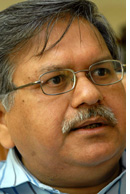| Interfaith Dialogue | |
| 02 Jun 2011, NewAgeIslam.Com |
| Role of Religions in promoting non-violence: Islam’s valuable resources for peacemaking | ||
Following the Prophet’s example, in the last century, the great leader of the then united India’s northwest frontier province, which is now known as Pakistan’s province of Khyber-Pakhtunkwa, Badshah Khan devised a strategy that harmonised the demands of a quest for Justice with the interests of peace. He was inspired by the Mahatma and was his greatest, most unflinching ally. But he had worked out his strategy of non-violent struggle and started his unique movement before meeting him. He said he had learnt this from his study of Quran and Hadith. He found his nonviolent strategy in Islam’s call for an unrelenting struggle against injustice and the Prophet’s constant exhortation for patience and perseverance. He brought the two virtues together and thus was born his unique movement of non-violent resistance against British colonial rule. He told his 100,000 strong non-violent army of khudai khidmatgars (Servants of God): “I am going to give you such a weapon that police and the army will not be able to stand against it. It is the weapon of the Prophet, but you are not aware of it. That weapon is patience and righteousness. No power on earth can stand against it. …tell your brethren that there is an army of God and its weapon is patience….”[xxv] Many scholars and peace activists who have studied the Khudai Khidmatgar movement in detail consider this as an Islamic model for non-violent struggle against injustice. Let us hope that Muslims all over the world take this as a model that is as relevant today as it was a century ago. -- Sultan Shahin, Editor, New Age Islam speaking at a parallel seminar organised by Al-Hakim Foundation and Himalayan Research in the UN Human Rights Council’s September 2010 session at Geneva on the International Day of non-violence:28 September 2010
| ||
| Role of Religions in promoting non-violence: Islam’s valuable resources for peacemaking | |
Following the Prophet’s example, in the last century, the great leader of the then united India’s northwest frontier province, which is now known as Pakistan’s province of Khyber-Pakhtunkwa, Badshah Khan devised a strategy that harmonised the demands of a quest for Justice with the interests of peace. He was inspired by the Mahatma and was his greatest, most unflinching ally. But he had worked out his strategy of non-violent struggle and started his unique movement before meeting him. He said he had learnt this from his study of Quran and Hadith. He found his nonviolent strategy in Islam’s call for an unrelenting struggle against injustice and the Prophet’s constant exhortation for patience and perseverance. He brought the two virtues together and thus was born his unique movement of non-violent resistance against British colonial rule. He told his 100,000 strong non-violent army of khudai khidmatgars (Servants of God): “I am going to give you such a weapon that police and the army will not be able to stand against it. It is the weapon of the Prophet, but you are not aware of it. That weapon is patience and righteousness. No power on earth can stand against it. …tell your brethren that there is an army of God and its weapon is patience….”[xxv] Many scholars and peace activists who have studied the Khudai Khidmatgar movement in detail consider this as an Islamic model for non-violent struggle against injustice. Let us hope that Muslims all over the world take this as a model that is as relevant today as it was a century ago. -- Sultan Shahin, Editor, New Age Islamspeaking on 28 September 2010 at a parallel seminar organised by Al-Hakim Foundation and Himalayan Research in the UN Human Rights Council’s September 2010 session at Geneva on the International Day of non-violence:28 September 2010 Full Text available at: http://www.newageislam.com/NewAgeIslamIslamAndSpiritualism_1.aspx?ArticleID=3606 URL for present Article : http://www.newageislam.com/controlpanel/ArticleDetails.aspx?Article_ID=4760
| |







 Moderate Islamist here
Moderate Islamist here


0 comments:
Post a Comment